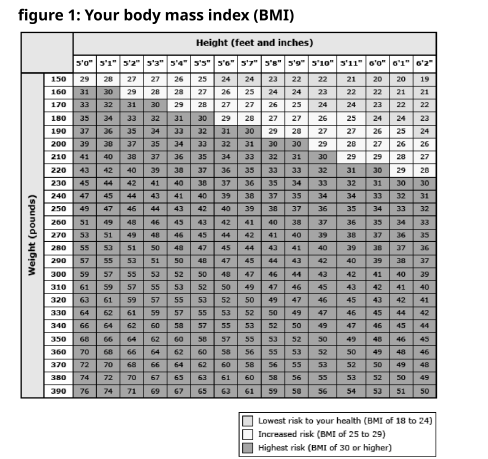You must carefully read the “Consumer Information Use and Disclaimer” below in order to understand and correctly use this
information.
What is obesity?
Doctors define obesity based on a person’s “body mass index,” or “BMI.” For adults, weight and height
are used to calculate BMI (figure 1).
For people who are White, Hispanic, or Black:
● “Overweight” means a BMI between 25 and 29.9.
● “Obesity” means a BMI of 30 or greater.
For people who are Asian, the cutoff numbers are a little different:
● “Overweight” means a BMI between 23 and 25.
● “Obesity” means a BMI of 25 or greater.
In addition to figuring out your BMI, your doctor might also measure around your belly. This is called
“waist circumference.” Doctors call it “central obesity” when people carry extra weight in the belly area,
even if their BMI is normal.
Obesity increases the risks of many different health problems. It can also make it harder for you to
move, breathe, and do other activities.
What are the health risks of obesity? —
Having obesity increases a person’s risk of developing many health problems. Here are just a few
examples:
● Diabetes
● High blood pressure
● High cholesterol
● Heart disease (including heart attacks)
● Stroke
● Sleep apnea (a disorder that makes you stop breathing for short periods while asleep)
● Asthma
● Cancer
18/09/2024, 11:28 Patient Education – UpToDate® Lexidrug™
https://online.lexi.com/lco/action/pcm 1/4
Does having obesity shorten a person’s life? —
Yes. Studies show that:
● People with obesity die younger than people who are a healthy weight.
● The risk of death goes up the heavier a person is. The degree of increased risk depends on how long the person has had obesity, and on what other medical problems they have.
People with central obesity (extra weight in the belly area) might also be at risk of dying younger.
Can medical treatments help me lose weight? —
Yes. There are medicines and surgery to help with weight loss. These treatments are meant for people
who have not been able to lose weight through lifestyle changes such as diet and exercise.
Weight loss treatments do not take the place of diet and exercise. People who have the treatments
must also change how they eat and how active they are.
How can I prevent the problems caused by obesity? —
The best thing you can do is lose weight. But even if weight loss is not possible, you can improve your
health and lower your risk if you:
● Become more active – Many types of physical activity can help, including walking. You can start
with a few minutes a day, and add more as you get stronger and build up your endurance.
Anything that gets your body moving is good for you. It is easier to create a habit if you choose
activities you enjoy.
● Improve your diet – It is healthy to have regular meal times, eat smaller portions, and not skip
meals. Limit sweets, and avoid processed foods. Try to eat more vegetables and fruits instead. The
best weight loss plans help you have a healthy view of eating.
● Quit smoking (if you smoke) – Some people start eating more after they stop smoking, so try to
make healthy food choices. Even if it increases your appetite, quitting smoking is still one of the
best things you can do to improve your health.
● Limit alcohol – For females of any age, limit alcohol to no more than 1 drink a day. For males 64
and younger, limit alcohol to no more than 2 drinks a day. For males 65 and older, limit alcohol to
no more than 1 drink a day.
Keeping a diary might help you reach your daily goals. You can use a paper diary or app to help you
record:
● What you eat and drink
● Your physical activity
● Your weight
What causes obesity? —
Your genes affect your risk of obesity. But lifestyle also has a big impact. You can develop obesity if you
eat too much, eat unhealthy foods, move too little, and watch a lot of TV.
There are other things that seem to increase the risk of obesity that you might not know about. Here
are some:
● Mother’s habits during and after pregnancy – People who eat a lot of calories, have diabetes, or
smoke during pregnancy have a higher chance of having babies who have obesity as adults. Also,
babies who drink formula might be more likely than breastfed babies to develop obesity later in
life.
● Habits and weight gain during childhood – Children or teens who are overweight or have obesity
are more likely to have obesity as an adult.
● Sleeping too little – People who do not get enough sleep are more likely to develop obesity.
● Taking certain medicines – Long-term use of certain medicines can cause weight gain. If you are
concerned that one of your medicines might be making you gain weight, talk to your doctor or
nurse. They might be able to switch you to a different medicine.
● Certain hormonal conditions – Some hormonal problems can increase the risk of developing
obesity. For example, hypothyroidism can cause weight gain, along with other symptoms.
What if I want to get pregnant? —
If you are overweight or have obesity, it might be harder to get pregnant. For males, obesity can also
cause sex problems, like having trouble getting or keeping an erection. This is more likely if you also
have high blood pressure or diabetes.
What if my child has obesity? —
In children, obesity has many of the same risks as it does in adults. For example, it can increase the risk
of diabetes, high blood pressure, asthma, and sleep apnea. It can also cause added problems related to
childhood. For example, obesity can make children grow faster than normal and cause girls to go
through puberty earlier than usual.
When should I call the doctor? —
Call your doctor or nurse if you want to try to lose weight. They can help you do it in a healthy way.
It can also help to work with a dietitian (food and nutrition expert). They can help you choose healthy
foods and plan meals.
All topics are updated as new evidence becomes available and our peer review process is complete.
This topic retrieved from UpToDate on: Jul 13, 2024.

Find your height (in feet and inches) in the top row. Then, find your weight (in pounds) in the first
column. Now, find where the column for your height and the row for your weight meet. That is your
BMI. For example, if you are 5-feet-9-inches tall and you weigh 260 pounds, your BMI is 38.
Graphic 62886 Version 4.0
Consumer Information Use and Disclaimer:
Disclaimer: This generalized information is a limited summary of diagnosis, treatment, and/or
medication information. It is not meant to be comprehensive and should be used as a tool to help the
user understand and/or assess potential diagnostic and treatment options. It does NOT include all
information about conditions, treatments, medications, side effects, or risks that may apply to a specific
patient. It is not intended to be medical advice or a substitute for the medical advice, diagnosis, or
treatment of a health care provider based on the health care provider’s examination and assessment of
a patient’s specific and unique circumstances. Patients must speak with a health care provider for
complete information about their health, medical questions, and treatment options, including any risks
or benefits regarding use of medications. This information does not endorse any treatments or
medications as safe, effective, or approved for treating a specific patient. UpToDate, Inc. and its
affiliates disclaim any warranty or liability relating to this information or the use thereof. The use of this
information is governed by the Terms of Use, available at
https://www.wolterskluwer.com/en/know/clinical-effectiveness-terms. 2024© UpToDate, Inc. and its
affiliates and/or licensors. All rights reserved.
© 2024 UpToDate, Inc. and/or its affiliates. All rights reserve


